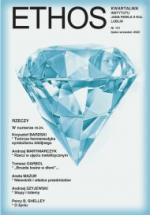 zobacz powiększenie | DOI 10.12887/33-2020-3-131-11 Aneta MAZUR, A Slave and a Ruler to Things: The Relationship between Man and Objects, as seen in the Prose of Realism Cena brutto: 7,00 PLN za szt. |
|
There were several reasons for raising the status of ‘things’ in literature in the period of realism, such as scientific world-view, the focus on material existence, thematic extension and mimetic description, and objective and detailed narrative style. The problem can be illustrated with the use of four models, or manners, in which things were treated in the vast domain of 19th-century realistic prose: (1) the thing as part of the meaningful and divine order of the universe, still in agreement with the metaphysical and philosophical tradition (e.g., the work of Biedermeier writer Adalbert Stifter, where the key notion of „thing” occurs as a leitmotiv, and catalogues of objects become a narrative obsession); (2) the thing as a symbolic requisite in the presented world (e.g., the work of German „poetic realist” Theodore Fontane, where things map and reflect the character’s fate); (3) the thing as a being alienated from man and becoming a dominant element in the relationship with him (usually in naturalistic concept of life, e.g., a moderate version of Naturalism in Anton Chekhov’s work, where things act sometimes grotesquely, sometimes aggressively towards people and contribute to their reification); (4) the thing as an intriguing phenomenon and central figure of the plot, seemingly independent from the human world but in fact closely bound up with it (e.g., short stories by Eliza Orzeszkowa, Anton Chekhov, and Giovanni Verga, where the topos of lacrimae rerum (“tears of things”) expresses social and personal misfortunes of people in the dynamic era of modernity). Unlike the 19th century anthropology, the 19th century literature did watchfully record the unavoidable human–thing connections which constitute the identity of both humans and things. Keywords: thing, realistic prose, Stifter, Fontane, Chekhov, Orzeszkowa, Verga Contact: Katedra Literatury Polskiej, Instytut Nauk o Literaturze, | |
